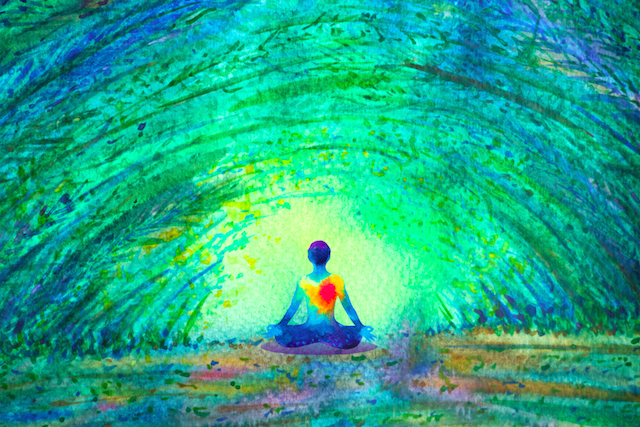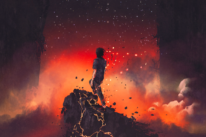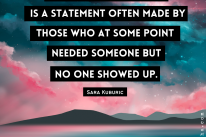
“If you have nothing to be grateful for, check your pulse.” ~Unknown
I couldn’t feel my legs.
There wasn’t any pain, just this odd “sameness” of non-sensation.
My body was frozen as I turned my eyes downward to scan down my nineteen-year-old body. Below my knees, my legs were splayed out in a very peculiar way. I was halfway underneath my car, pinned down to the dirt and gravel of the road by the back right tire.
The tire had caught my long, curly hair and the puffy left sleeve of my new white peasant blouse, miraculously missing my face.
Blessing Number 1:
In the distance, I could hear my two best friends shouting for help; as passengers, they were fast asleep when I fell asleep driving, hitting a tree and rolling the car. Thankfully, they escaped unscathed.
Blessing Number 2:
My vehicle was lifted off my broken body, and I was carefully hoisted into the ambulance. Without warning, pain seared through me like nothing I’d ever experienced. I remember worrying about my parents and how upset they would be that I’d crashed the car.
The blur of the ER swirled around me, and I was quickly positioned on an ice-cold steel table.
I could hear the ripping sound of my clothes as they were cut off my body. I was aware enough to be embarrassed when they got to my underwear. With no time for pain medication, the doctors yanked my left leg straight. Both of my femurs were badly broken and had to immediately be put in traction.
When it came time for leg number two, the attending doctor told me it was okay to scream, so I did—loudly.
I can still see my mother standing in the doorway of the ER. I will never forget the look of fear and horror on her beautiful face. Not wanting her to suffer, I looked up and said, “Mommy, I’m okay.”
It’s been nearly four decades since my accident, and my eyes still well up as I share this part of my story. Not because of what transpired over the next extremely difficult year, but for the pain it caused my parents. It seems that while I woke up physically under the car, I had also woken up in spirit.
Blessing Number 3:
Before the accident that was to define my life, I was a carefree, hippie-type, artsy teen. Nothing bothered me; I went with the flow, was basically happy, and, like all teenagers, believed I was invincible. Traction, a body cast, a blood clot in my lungs, and a wheelchair would teach me that nothing was further from the truth.
The details of the next twelve months don’t really matter, although they certainly did at the time. All I know is that facing my mortality at such a young age was the greatest gift of my life. Everything that I had taken for granted was gone—I lost everything during that time, from walking to finishing college to using the bathroom and everything in-between.
Blessings Number 4, 5, 6… infinite:
Over the course of the next year, I graduated from traction to a full body cast, into a wheelchair, onto crutches with a leg brace that wrapped around my hip, and eventually to a cane. Just before my twentieth birthday, I was set free, finally able to walk on my own again.
Walking is something almost all of us completely take for granted, but not me, and never again. With each literal “step” back into life, I became more and more grateful. It wasn’t just the joy of advancing from a bedpan to a toilet, but to live in a place that had a toilet. To live in a country where insurance paid my staggering medical bills. To live!
I was grateful to have a family that stayed by my side, day in and out over the course of that year, through multiple surgeries and life-threatening situations. A mother that drove the hour back and forth daily for the three-plus months that the hospital was my home. A father and brother who pressed their hands into my ribcage for an entire night to alleviate the pain of a blood clot that had traveled the distance from my right calf to my right lung.
I was grateful for my older sister, who brought her toddler every week to sit on my stomach while my two legs were in traction. I was grateful to experience life in a wheelchair, being looked at with pity and wanting to scream, “I’m going to walk again!” to total strangers. Grateful for two legs that were still the same length. Grateful to be alive, and so much wiser than my peers.
As soon as I could walk, I returned to college, finished my art degree, and went out into the world. At twenty-seven, I fell madly in love with a crazy comedian, who became my husband and the father of my children.
During our thirteen years together, we traveled the corners of the earth, living a life of love and laughter. Until we didn’t. The loss of my marriage is another story, but I will say this: It was as dramatic and painful as breaking both of my legs and not walking for a year.
There was no money; I lost my home and was forced into bankruptcy.
The word “accident” is defined as “an unfortunate incident that happens unexpectedly and unintentionally, typically resulting in damage or injury,” or “an event that happens by chance or that is without apparent or deliberate cause.”
Losing everything was completely unexpected, extremely unfortunate, and most definitely damaging.
While the signs leading up to the demise of my marriage had been there all along, I had spent years pushing them down to a place where they couldn’t hurt me—at least not then. But I was much wiser this round: I knew that, in order to survive, I had better look for the blessings.
Being broke meant my two sons and I staying home, making cardboard box forts and lots of brownies, which was actually my preference!
The animals we rescued, that my ex-husband never wanted, were to love us for the next fifteen-plus years.
Losing my marriage revealed who my friends really were.
Having no money pushed me into single, working-mom mode, earning me a badge of courage that I proudly still wear today.
My boys learned too: Losing our home made all of us appreciate our tiny rented condo and everything we shared in that beautiful, intimate space. Thousands of art projects, play dates, and burnt Eggo waffles later, my children and I became closer than I ever could have imagined.
To navigate and process my pain, I became a “seeker,” which led me to incredible teachers, a lifelong meditation practice, becoming an author, lots of art, and a master’s degree in art therapy.
Over time, I understood the true meaning of forgiveness and self-love, which fully opened my heart and my life. I understood that compassion was the answer to almost everything, and embarked on a path of helping others overcome hardship. This has become the most gratifying part of my life.
I learned the beauty and blessings of the present moment, and how to stay there. I learned that loving someone with all of my heart did not mean sacrificing my own dreams.
In the end, losing everything led directly to me finding myself.
Both accidents taught me this: It’s easy to find things to be grateful for when life is wonderful. The key is finding things to be grateful about during and in challenge, so we feel good more of the time.
Here’s how I did it: I learned to look at just about every situation and ask this question: “What’s good about that?”
This was no easy feat, and I’m not at all saying that when life gets hard or tragedy strikes, we should immediately be expected to feel grateful. I certainly didn’t. Gratitude is a path and practice, and finding blessings-in-disguise can take years, even a lifetime.
I believe that genuine gratitude is simply about finding good things in less time, whatever that is for you, and however you need to get there.
Knowing all I know now, am I grateful enough to say I am glad it all happened? My accidents made me who I am, and I’m not sure how I would have gotten here without the hardship. So, in that sense, I can honestly say that I wouldn’t change a thing.
I am most thankful for my abiding trust in the knowledge that looking for what’s good in hardship is a transformative way to live, and it both humbles and amazes me. The present moment is all we have, so we may as well find peace in it.
I have absolute faith that by looking at all areas of life—emotional, social, physical, spiritual, familial, and vocational—and asking, “What’s good about that?” I will always have something to be grateful for, even if it’s simply using the bathroom again.
About Elizabeth Bryan-Jacobs
Elizabeth Bryan-Jacobs is an artist, art therapist, and bestselling Chicken Soup for the Soul and Soul Models author. She is passionate about awakening clients to the healing trifecta of creativity, mindfulness, and nature and the transformative power of dreamwork, facilitating an ongoing journey of connection and enlightenment. Elizabeth shares creativity retreats at exclusive venues like Canyon Ranch and the Golden Door Spa. She works privately and with groups and can be found at www.creativeawakenings.net.













 Though I run this site, it is not mine. It's ours. It's not about me. It's about us. Your stories and your wisdom are just as meaningful as mine.
Though I run this site, it is not mine. It's ours. It's not about me. It's about us. Your stories and your wisdom are just as meaningful as mine. 